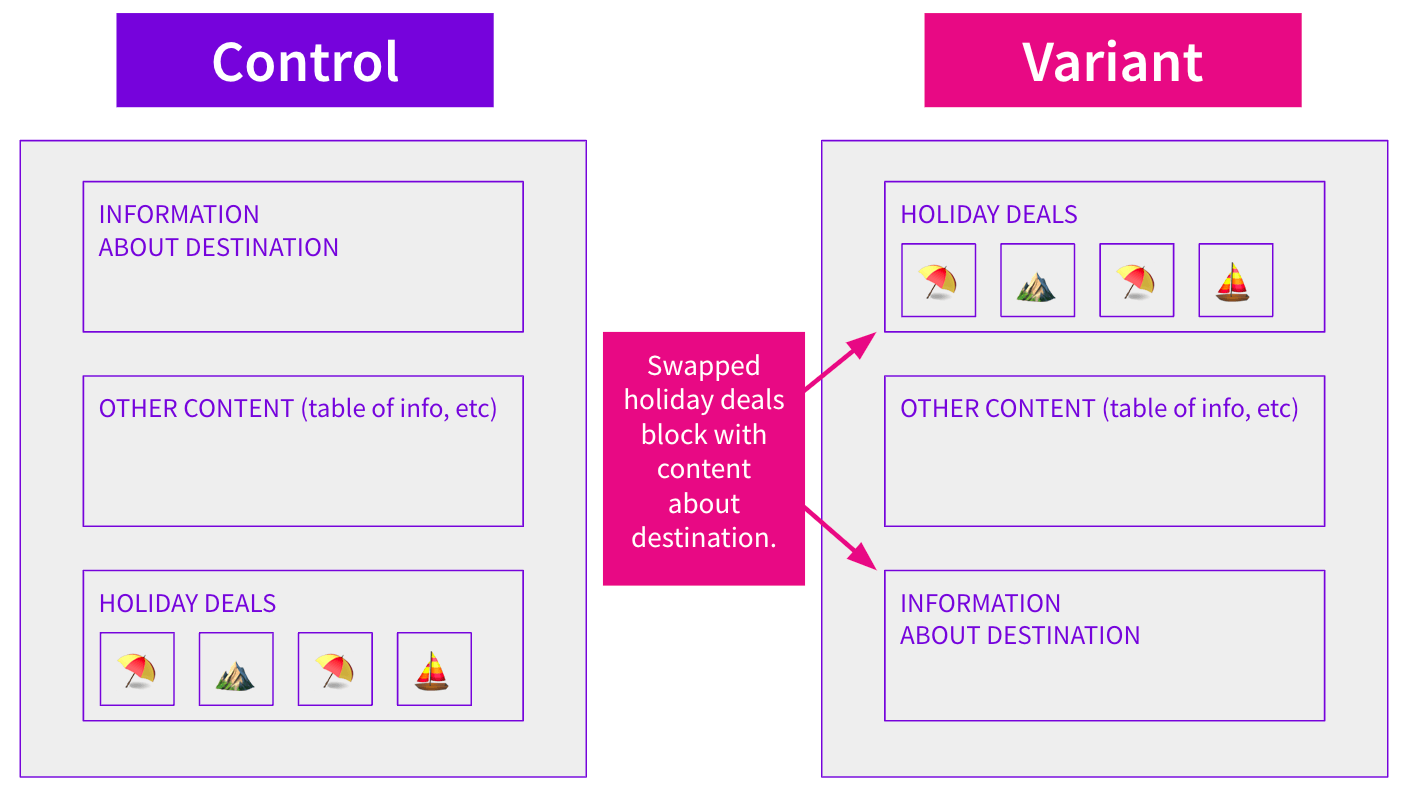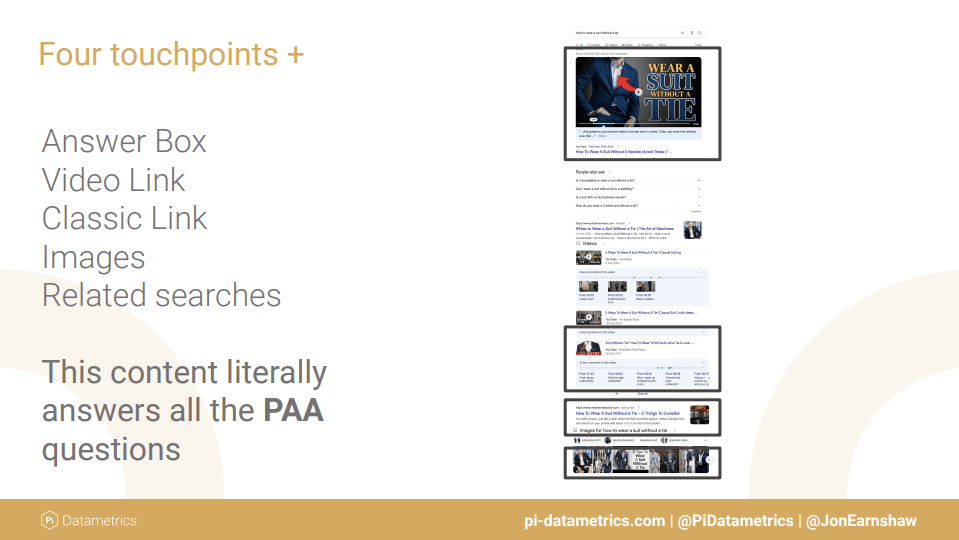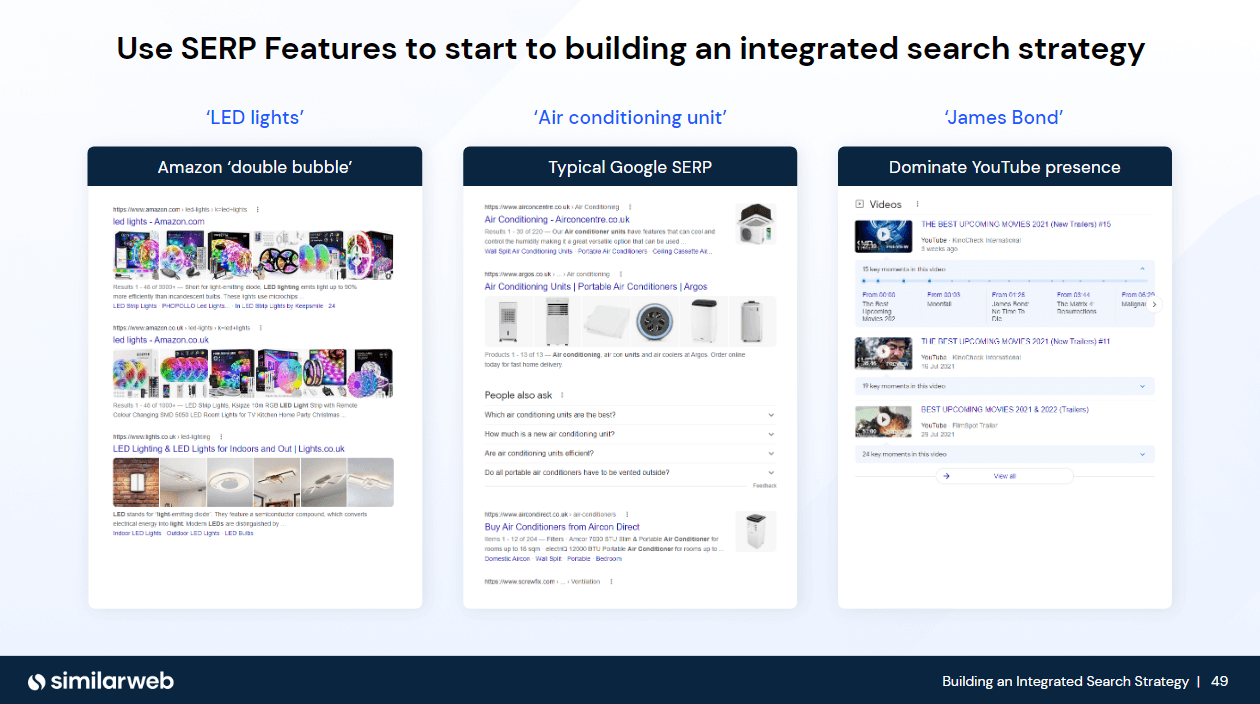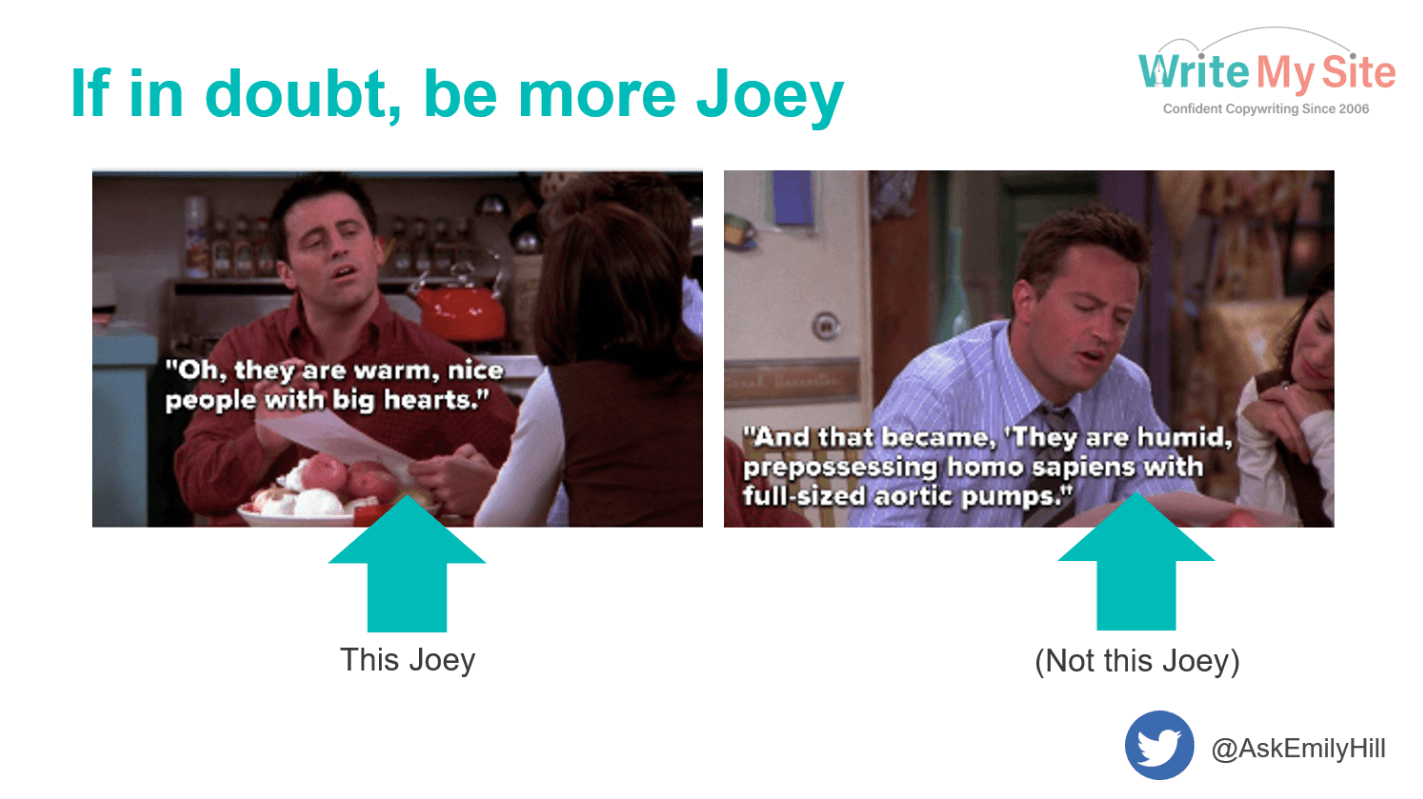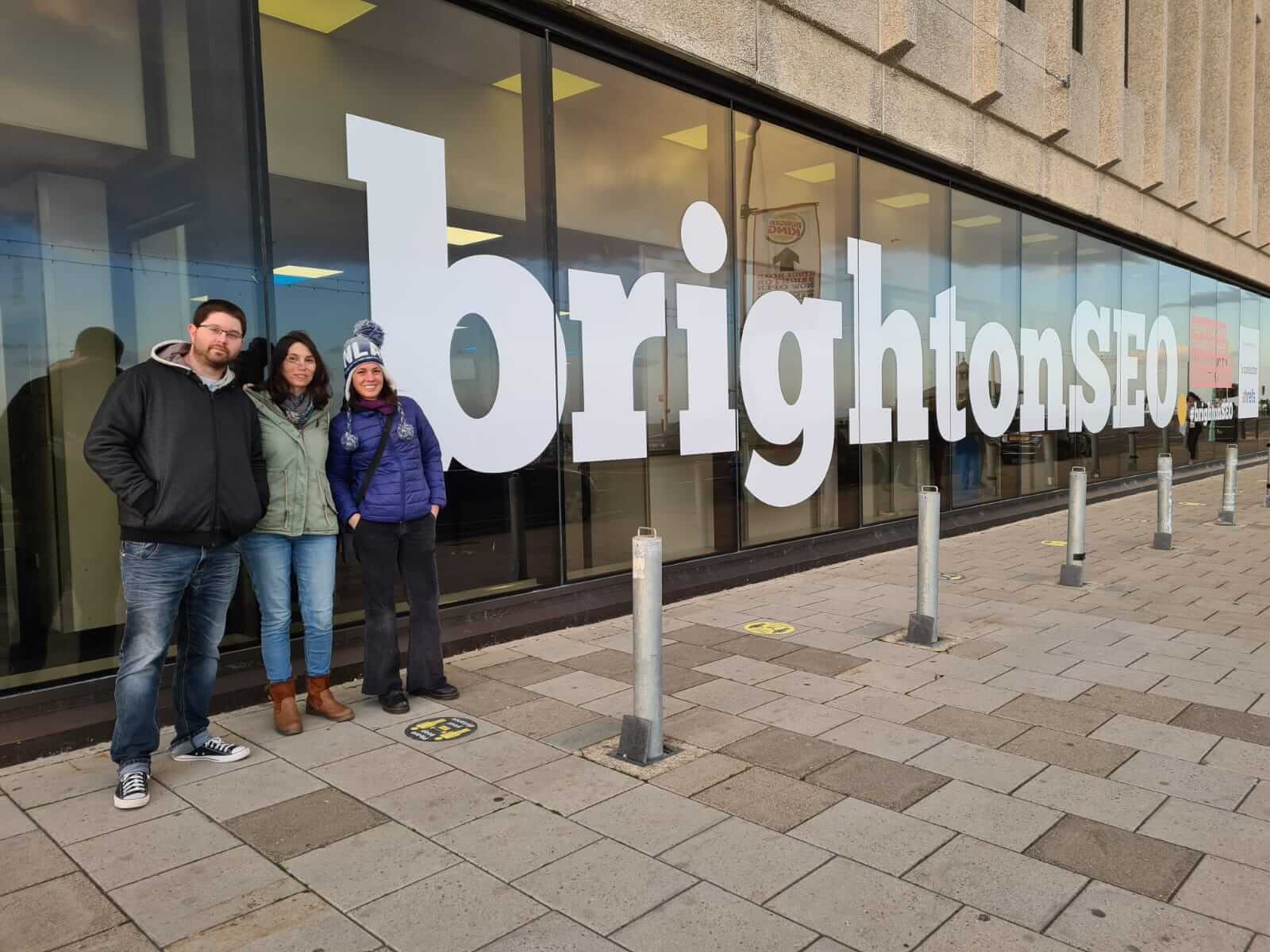8 Takeaways From brightonSEO 2022

*May 24 Update – I visited Brighton again in 2024! You can read all about it here – 5 Key Takeaways from BrightonSEO 2024
After two years of being landlocked due to the pandemic, I had the opportunity to attend brightonSEO across the pond with my director and a co-worker. We enjoyed the talks, the booths, the swag, and of course, the networking with SEOs from different countries and industries.
There was loads to learn and my agenda was packed with amazing talks, but here are my favorite takeaways from brightonSEO:
1. A/B test your SEO efforts
Topic: Lessons From Hundreds of SEO A/B Tests
Speaker: Will Critchlow, Founder and CEO, SearchPilot
As an SEO, I know how hard it can be to rank high for a competitive keyword, and once you get through optimizing and tweaking to get to that #1 spot, why fix something if it isn’t broken?
That’s what Will discussed in his talk on the importance of website A/B testing in SEO, where he showed results from various tests SearchPilot performed, alongside polls where SEOs were asked how they thought each test would go.
One particularly notable test focused on rearranging a site page layout to see how it would impact SEO – a bit of digital feng shui.
The answer? Believe it or not, the changes impacted the site negatively, which I suspect was due to the fact that content was actually pushed below the fold.
Another test SearchPilot performed used a “data-nosnippet” attribute to try and force Google to respect meta descriptions. It basically checked if Google writes better meta descriptions than us, and the effect on CTR.
Surprisingly, the test showed that forcing Google to show its meta descriptions had a negative effect. Why? Because your pages rank for many long-tail keywords, and it turned out that Google’s rewrites of meta descriptions were able to better answer different search queries, resulting in higher click-through rates.
Takeaway – For better or worse, don’t be afraid to perform A/B tests on your organic pages. Not doing anything might actually set you back, and give time for competitors to try and outrank you.
2. Find more opportunities for SERP features (and find them again)
Topic: The Hidden Power of the SERP
Speaker: Jon Earnshaw, Chief Product Evangelist and Co-Founder, Pi Datametrics
I have to say – Jon was honestly one of the best speakers I ever had the chance to hear in my life. I don’t think I’ve ever seen a presentation as engaging as his – and you won’t catch me saying that often. He spoke about the changing landscape of the SERP in different industries, and how we can get our website in as many SERP features as possible to increase our brand visibility.
This was my favorite slide:
This site is crushing it for the keyword “how to wear a suit without a tie”!
Takeaway – For every piece of content and every competitor that ranks for the keyword we want, we need to give more weight to SERP features, see what’s new, and take over missed SERP opportunities. For example:
- Is there a video carousel? Ask the content team for a video to accompany the blog post.
- Is there an image carousel? Consider creating an embeddable infographic to rank and for people to backlink to your site as the source.
- Is there a “People also ask” box? Try answering as many questions as you can on the content, or even create an FAQ section that answers them.
3. Understand SERP feature trends
Topic: Win the SERPs: A Story of SERP Feature Trends
Speaker: Gerald Murphy, Senior Solution Business Manager, Similarweb
In his talk, Gerald analyzed both U.S. and U.K. SERP features by industry, keyword, and device, using Similarweb data to reveal various noteworthy trends:
- Branded vs. non-branded keywords – Non-branded keywords have a higher amount of SERP features, like related questions, related searches, and organic inlinks, as compared to branded keywords.
- Desktop vs. mobile – Desktop is triggering much more SERP features than mobile in both the U.S. and the U.K.
- Effect of COVID-19 on varying industries – eCommerce was obviously heavily affected by COVID-19, increasing popularity of PLAs, images, and videos SERP features.
This was my favorite slide:
Takeaway – Constantly analyze SERP feature trends in your industry and adjust your search strategy as needed. As real-life changes happen, the SERP changes accordingly, adjusting itself to what searchers need.
4. Find large-scale solutions for enterprise-level sites
Topic: How Do You Optimize the World’s Largest Website?
Speaker: Dan Morehead, Senior SEO Analyst, BBC
The first reason I loved Dan’s presentation as much as I did was that he used Similarweb data to show that bbc.co.uk is the leading U.K. news site 🙂
The second, admittedly less-biased reason is that Dan revealed the many challenges of enterprise SEO while sharing with the audience the different sections of the BBC website and how each of them addresses a different content “world”. Intrigued? Me too.
One of the best examples Dan gave on how he scales content-creating and SEO was to build news hub pages for each town in the U.K. This means that every time someone searches for {town name + news}, the BBC will have a presence in that SERP, and with the BBC’s massive authority, it’s also very likely to rank well.
Takeaway – This is very relevant for us at Similarweb, as we have so much data, and we love to share large-scale amounts of pages with data. For example:
- Top Websites Ranking for almost the entire web, plus specific site analyses
- Top Apps Rankings for both Android and iOS
- Top Browsers Market Share by platform and country
- Top Search Engines Market Share by platform and country
- Mobile vs. Desktop vs. Tablet Traffic Market Share by country
Just like the BBC, we’re always looking for new ways to increase the amount of data that we can share with the internet, and as SEOs, use that to rank for the right keywords.
5. Don’t be a content hoarder
Topic: Drowning in Content? How to Tackle “Digital Hoarding”
Speaker: Adrian Imms, Head of Digital Content (Digital and Creative Media), University of Sussex
So basically, Adrian gave an amazing lecture on how to deal with people…well, like me.
As a self-proclaimed content hoarder, I can attest to how hard it is to let go of old organic traffic, even if it’s only raking in a few clicks a month and doesn’t align with your current content strategy. In his lecture, Adrian explained how people become content hoarders, why it’s bad for business, and how to stop it.
Takeaway – We at Similarweb actually learned this lesson about a year ago, when we analyzed our own blog and removed around 500 old blog posts. Doing this really helped us be more accurate with our SEO plan, focus on the right topics, get new ideas, and set the course for a brighter future with our blog.
6. Low search volume? Find the right KPIs!
Topic: The Hidden Gems of Low Search Volume
Speaker: Liraz Postan, International B2B SEO and Content Consultant
In her talk, Liraz discussed the real potential of low search volume, long-tail keywords, and why we sometimes need to stop looking at high search volumes.
The real problem arises when we want to get resources. When asking for a budget for writers, editors, buying images, and work hours of everyone involved, we probably encounter these questions:
- What is the search volume?
- How much traffic will we get?
Seeing website traffic is very important to people like CMOs – they want to increase their brand awareness and exposure. You’re still investing the same amount of content efforts, so why should you have to work with keywords that have minimal monthly searches?
Liraz claims that when you’re dealing with low search volumes, you need to find the right KPIs.
Some examples she gave:
- Newly launched products – Obviously these have a low amount of searches when they launch, but that’s exactly your opportunity to write fresh content about them that’ll have an easier time ranking. If you’re quick to rank, you could become an early source for other sites to use as a reference, earning you natural backlinks, and later as the search volume goes up, scoring that traffic.
- Trends – Trendspotting is crucial. It helps you discover new trends, identify keyword seasonality, and more. Like newly launched products – it helps you get that traffic.
- Niche content – I really liked Liraz’s definition of this as “content that solves questions”. It doesn’t matter if you have a website that’s entirely dedicated to a niche audience, or a large website that covers various topics – you can always find and cater to the niche.
Takeaway – I wouldn’t give up high-search volume keywords yet, but when finding the right opportunities and KPIs, low-search-volume keywords can be gold.
7. Optimize your content for readability
Topic: Content Readability for SEO
Speaker: Emily Hill, CEO, Write My Site
When I’m creating a content brief for a new blog post, I always look at my competitors’ content, see what they’re ranking for, do keyword research, and zero in on the lengths of the pieces of content to get a sense of what my post length should be – sometimes a bit longer to outperform them.
In her talk, Emily discussed the subject of readability and its connection to both readers and SEO. She gave a very surprising stat, saying that readability data suggest that the average reading age of the U.K. population is 9 years!
Not the target audience you’re aiming for when writing B2B SaaS content, am I right?
This, however, doesn’t mean you need to dumb down your content. What you do need to do is make your content more accessible to your readers, simplifying the way you write in order to reach as many people as possible.
Here are some of the great tips she gave:
- Write shorter sentences
- Make one point per paragraph
- Arrange stats logically
- Make sure the purpose/audience is clear
- Swap complicated words with simpler ones (Individual – person, therefore – so, understanding – view)
Takeaway – When in doubt, be more Joey.
8. Don’t be a (keyword) cannibal
Topic: Don’t Be a Cannibal: Identifying and Avoiding Keyword Cannibalization
Speaker: Limor Barenholtz, Director of SEO, Similarweb
I’m not just saying this because she’s my boss, but Limor’s talk was amazing! (Looking forward to that pay raise!)
Kidding aside, Limor tackled a major pain point for SEOs – keyword cannibalization.
Many websites, large and small alike, struggle with this issue, as some pages or even entire sections of their websites contain content that competes with similar content on the same website. This is especially bad for search engines as they crawl your website, unsure which content they should be indexing and ranking.
Limor explained that clarity is key, and if the content on your site is unclear to users (and search engines), you’ll lose traffic in the long run.
After explaining the different types of keyword cannibalization and how to identify them, Limor shared with the audience her tips for fixing it:
- Build a detailed SEO map: Create a Google Doc/Excel file to list your main pages and blog.
- Once you have that file, you can easily locate duplications.
- Adjust your SEO map so every URL has unique matched phrases, then assign each of them the relevant keyword you’re trying to rank for.
- Roll out onto your conflicting pages and consider merging pages into one authoritative page.
- Align the internal linking structure of your site.
- Align outreach activities to the new map: Get those backlinks to the right pages in order to build authority.
- Align paid activities with organic efforts: Set rules and guidelines to see where PPC should support SEO, and where it’s less needed.
Takeaway – Always listen to your boss, don’t be a cannibal, and don’t forget to monitor ranking performance and update your SEO map.
Wrapping up
BrightonSEO was an incredible event, and I’m truly grateful that I had the opportunity to attend, represent Similarweb, spend quality time with my team, see our amazing booth in action, and learn new things about the world of SEO.
This will not be my last visit.
The #1 keyword research tool
Give it a try or talk to our marketing team — don’t worry, it’s free!
